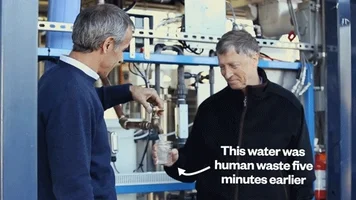When it
comes to recycled water, consumers won't
University of California - Riverside
 If people are educated on recycled
water, they may come to agree it's perfectly safe and tastes as good -- or better
-- than their drinking water. They may even agree it's an answer to the
critical water imbalance in California, where the northern third of the state
holds 75% of the water despite 80% of the demand coming from the southern
two-thirds.
If people are educated on recycled
water, they may come to agree it's perfectly safe and tastes as good -- or better
-- than their drinking water. They may even agree it's an answer to the
critical water imbalance in California, where the northern third of the state
holds 75% of the water despite 80% of the demand coming from the southern
two-thirds.
But that doesn't mean they're going
to use recycled water -- and it sure doesn't mean they'll drink it. And the
reason lies in the word "disgust."
That's the result of a series of
studies by UC Riverside psychology researchers Mary Gauvain and Daniel Harmon
published recently in the journal Basic and Applied Social Psychology.
Past research by Harmon and Gauvain
explored whether people sense a difference in taste among recycled water,
conventional tap water, and commercially bottled water. That study, released in
spring 2018, was based on a blind taste test and found people actually
preferred the taste of recycled water over conventional tap water.
However, "The idea of recycled
wastewater in general evokes disgust reactions," Harmon said at the time.
This idea was addressed in the psychologists' latest research. If people disgusted by the notion of recycled wastewater are educated on its safety and benefits, will their attitudes change? And, will they change their behaviors?
In the research paper,
"disgust" is defined as "a strong repulsion to a potentially
harmful substance." In addition to disgust, the research considered other
factors that dissuade people from using recycled water. Those included
misinformation, ignorance, and peoples' desire to conform to social norms.
The research involved three separate
studies and a total of 886 participants.
In study one, half of the subjects
viewed a brief, pro-conservation internet video. The other group watched a
short video about water, but not conservation, about the urban myth that
crocodiles live in the sewer system of New York City.
Researchers found both groups failed
to budge in their willingness to endorse sustainable water.
Ninety-six percent of participants cited disgust as the reason. Distilling the reasoning even more, the researchers asked if participants were motivated by cleanliness or fear of illness. Sixty-five percent said cleanliness.
Ninety-six percent of participants cited disgust as the reason. Distilling the reasoning even more, the researchers asked if participants were motivated by cleanliness or fear of illness. Sixty-five percent said cleanliness.
In study two, the videos were used
again. But this time, an educational video demonstrating recycled wastewater is
contaminant-free was also shown to address the disgust reaction. The
pro-conservation and disgust videos had a "small but unsubstantial effect
on peoples' willingness to use recycled wastewater" the research found.
In the last study, participants
viewed all three videos. But this time, after completing a post-video survey,
they were offered a bottle of water labeled "SMARTdrop -- Pure Recycled
Water" and asked to sign a conservation petition.
Researchers hypothesized
participants who watched the video addressing disgust would be more likely to
accept the water and sign the petition. In fact, a similar number across all
three groups -- about two-thirds -- took the water bottle and signed the
petition.
The results of the three studies run
counter to previous findings that assert media information can influence
peoples' water conservation attitudes. Instead, they show internet messages may
encourage people to view water sustainability more positively, but they do not
encourage more sustainable water behaviors.
The article drawn from the research,
"Influence of Internet-Based Messages and Personal Motivations on
Water-Use Decisions," discourages using pro-recycled wastewater internet
videos about water scarcity and conservation alone.
Instead, researchers urge a focus on the more visceral roadblock of disgust. As an example, the researchers suggest a video stressing the extent of water purification in recycling plants as part of larger campaigns to change behaviors.
Instead, researchers urge a focus on the more visceral roadblock of disgust. As an example, the researchers suggest a video stressing the extent of water purification in recycling plants as part of larger campaigns to change behaviors.
"Disgust is an exceptionally
robust motivation that may require stronger intervention to overcome,"
Harmon said.